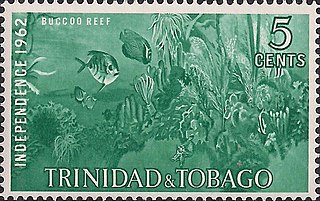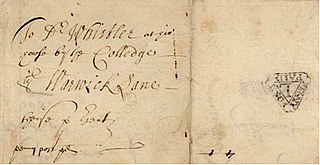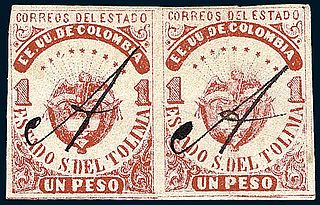
This is a survey of the postage stamps and postal history of Nicaragua.

This is a survey of the postage stamps and postal history of Nicaragua.
Nicaragua gained independence from Spain in 1821. It has produced its own stamps since 1862. [1]
Collectors of the stamps and covers of Nicaragua join the Nicaragua Study Group. Search the web to find the group.

Philately is the study of postage stamps and postal history. It also refers to the collection and appreciation of stamps and other philatelic products. While closely associated with stamp collecting and the study of postage, it is possible to be a philatelist without owning any stamps. For instance, the stamps being studied may be very rare or reside only in museums.

Stamp collecting is the collecting of postage stamps and related objects. It is an area of philately, which is the study of stamps. It has been one of the world's most popular hobbies since the late nineteenth century with the rapid growth of the postal service, as a stream of new stamps was produced by countries that sought to advertise their distinctiveness through their stamps.

Philatelic literature is written material relating to philately, primarily information about postage stamps and postal history.

A privately run packet service for mail existed in British Guiana in 1796, and continued for a number of years. Postage stamps of Britain were used in those days at Georgetown (Demerara) and Berbice. The first adhesive stamps produced by British Guiana were issued in 1850.
This is a survey of the postage stamps and postal history of Hong Kong.

Cundinamarca is a department of Colombia, one of the original nine states of the "United States of Colombia".

This is a survey of the postage stamps and postal history of Tibet.

The Roll of Distinguished Philatelists (RDP) is a philatelic award of international scale, created by the Philatelic Congress of Great Britain in 1921. The Roll consists of five pieces of parchment to which the signatories add their names.

The Gibraltar Study Circle is a global non-profit society based in the United Kingdom, founded by Walter (Wally) Jackson in 1975. Its aim is to expand the knowledge of the philately of Gibraltar, a British overseas territory located at the entrance to the Mediterranean Sea overlooking the Strait of Gibraltar. The study circle looks at the philately of Gibraltar in all its forms for the benefit of collectors (philatelists) from all walks of life. This includes studying the postal history, postage stamps, revenue stamps, postal stationery and associated overprints from Gibraltar and any of these used in Morocco. Any new information is shared with the membership via its quarterly journal, "The Rock", which has been published since 1975, showing articles of interest not only to philatelists but also historians, artists and sociologists.

The Revenue Society was formed in 1990 and is the only international philatelic society which covers revenue stamps of the whole world. The society is also noted for the particularly high quality of its journal which has published many articles on subjects about which little or nothing has previously been written.

Panama was formerly a department of Colombia and used overprints of Colombian stamps from 1878 until it gained independence in 1903. However, from 1903 to 1905 sets of stamps with overprints were still used and it was only in 1906 that the first printed stamps by the Panamanian postal administration were produced with República de Panamá.

This is a survey of the postage stamps and postal history of Trinidad and Tobago.

This is a survey of the postage stamps and postal history of Saint Helena.

This is a survey of the postage stamps and postal history of Tristan da Cunha.

The Fletcher Collection is Hugh Greenwell Fletcher's lifetime philatelic collection of British postage stamps and British stamps used abroad including overprints and non-stamp items such as postal stationery. On his death in 1968, the collection was bequeathed to the Bruce Castle Museum in Tottenham, once the home of Sir Rowland Hill. The collection was donated to the British Library in 1989.
Lionel William Fulcher B.Sc. was a British philatelist who co-edited, with Stanley Phillips, Gibbons Stamp Monthly, was Vice President of the International Philatelic Union and was a key figure in the Fiscal Philatelic Society. He was an expert on the early stamps of Japan and also studied Venezuela, Peru, Nicaragua, Papal States and Norway.
This is a survey of the postage stamps and postal history of Grenada.

This is a survey of the postage stamps and postal history of Haiti.

This is a survey of the postage stamps and postal history of Tolima.

This is a survey of the postage stamps and postal history of the Ryukyu Islands.